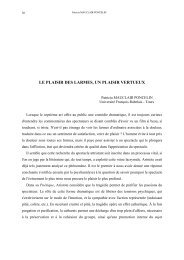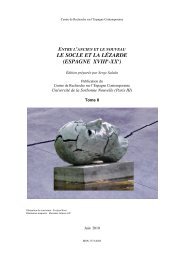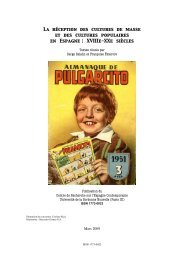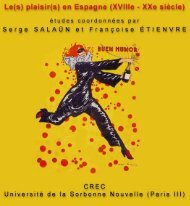- Page 2 and 3:
OCIO Y OCIOSDU LOISIR AUX LOISIRS(E
- Page 4 and 5:
Centre de Recherche sur l’Espagne
- Page 6 and 7:
Centre de Recherche sur l’Espagne
- Page 8 and 9:
Centre de Recherche sur l’Espagne
- Page 10 and 11:
Centre de Recherche sur l’Espagne
- Page 12 and 13:
Centre de Recherche sur l’Espagne
- Page 14 and 15:
Centre de Recherche sur l’Espagne
- Page 16 and 17:
Centre de Recherche sur l’Espagne
- Page 18 and 19:
Centre de Recherche sur l’Espagne
- Page 20 and 21:
Centre de Recherche sur l’Espagne
- Page 22 and 23:
Centre de Recherche sur l’Espagne
- Page 24 and 25:
Centre de Recherche sur l’Espagne
- Page 26 and 27:
Centre de Recherche sur l’Espagne
- Page 28 and 29:
Centre de Recherche sur l’Espagne
- Page 30 and 31:
Centre de Recherche sur l’Espagne
- Page 32 and 33:
Centre de Recherche sur l’Espagne
- Page 34 and 35:
Centre de Recherche sur l’Espagne
- Page 36 and 37:
Centre de Recherche sur l’Espagne
- Page 38 and 39:
Centre de Recherche sur l’Espagne
- Page 40 and 41:
Centre de Recherche sur l’Espagne
- Page 42 and 43:
Centre de Recherche sur l’Espagne
- Page 44 and 45:
Centre de Recherche sur l’Espagne
- Page 46 and 47:
Centre de Recherche sur l’Espagne
- Page 48 and 49:
Centre de Recherche sur l’Espagne
- Page 50 and 51:
Centre de Recherche sur l’Espagne
- Page 52 and 53:
Centre de Recherche sur l’Espagne
- Page 54 and 55:
Centre de Recherche sur l’Espagne
- Page 56 and 57:
Centre de Recherche sur l’Espagne
- Page 58 and 59:
Centre de Recherche sur l’Espagne
- Page 60 and 61:
Centre de Recherche sur l’Espagne
- Page 62 and 63:
Centre de Recherche sur l’Espagne
- Page 64 and 65:
Centre de Recherche sur l’Espagne
- Page 66 and 67:
Centre de Recherche sur l’Espagne
- Page 68 and 69:
Centre de Recherche sur l’Espagne
- Page 70 and 71:
Centre de Recherche sur l’Espagne
- Page 72 and 73:
Centre de Recherche sur l’Espagne
- Page 74 and 75:
Centre de Recherche sur l’Espagne
- Page 76 and 77:
Centre de Recherche sur l’Espagne
- Page 78 and 79:
Centre de Recherche sur l’Espagne
- Page 80 and 81:
Centre de Recherche sur l’Espagne
- Page 82 and 83:
Centre de Recherche sur l’Espagne
- Page 84 and 85:
Centre de Recherche sur l’Espagne
- Page 86 and 87:
Centre de Recherche sur l’Espagne
- Page 88 and 89:
Centre de Recherche sur l’Espagne
- Page 90 and 91:
Centre de Recherche sur l’Espagne
- Page 92 and 93:
Centre de Recherche sur l’Espagne
- Page 94 and 95:
Centre de Recherche sur l’Espagne
- Page 96 and 97:
Centre de Recherche sur l’Espagne
- Page 98 and 99:
Centre de Recherche sur l’Espagne
- Page 100 and 101:
Centre de Recherche sur l’Espagne
- Page 102 and 103:
Centre de Recherche sur l’Espagne
- Page 104 and 105:
Centre de Recherche sur l’Espagne
- Page 106 and 107:
Centre de Recherche sur l’Espagne
- Page 108 and 109:
Centre de Recherche sur l’Espagne
- Page 110 and 111:
Centre de Recherche sur l’Espagne
- Page 112 and 113:
Centre de Recherche sur l’Espagne
- Page 114 and 115:
Centre de Recherche sur l’Espagne
- Page 116 and 117:
Centre de Recherche sur l’Espagne
- Page 118 and 119:
Centre de Recherche sur l’Espagne
- Page 120 and 121:
Centre de Recherche sur l’Espagne
- Page 122 and 123:
Centre de Recherche sur l’Espagne
- Page 124 and 125:
Centre de Recherche sur l’Espagne
- Page 126 and 127:
Centre de Recherche sur l’Espagne
- Page 128 and 129:
Centre de Recherche sur l’Espagne
- Page 130 and 131:
Centre de Recherche sur l’Espagne
- Page 132 and 133:
Centre de Recherche sur l’Espagne
- Page 134 and 135:
Centre de Recherche sur l’Espagne
- Page 136 and 137:
Centre de Recherche sur l’Espagne
- Page 138 and 139:
Centre de Recherche sur l’Espagne
- Page 140 and 141:
Centre de Recherche sur l’Espagne
- Page 142 and 143:
Centre de Recherche sur l’Espagne
- Page 144 and 145:
Centre de Recherche sur l’Espagne
- Page 146 and 147:
Centre de Recherche sur l’Espagne
- Page 148 and 149:
Centre de Recherche sur l’Espagne
- Page 150 and 151:
Centre de Recherche sur l’Espagne
- Page 152 and 153:
Centre de Recherche sur l’Espagne
- Page 154 and 155:
Centre de Recherche sur l’Espagne
- Page 156 and 157:
Centre de Recherche sur l’Espagne
- Page 158 and 159:
Centre de Recherche sur l’Espagne
- Page 160 and 161:
Centre de Recherche sur l’Espagne
- Page 162 and 163:
Centre de Recherche sur l’Espagne
- Page 164 and 165:
Centre de Recherche sur l’Espagne
- Page 166 and 167:
Centre de Recherche sur l’Espagne
- Page 168 and 169:
Centre de Recherche sur l’Espagne
- Page 170 and 171:
Centre de Recherche sur l’Espagne
- Page 172 and 173:
Centre de Recherche sur l’Espagne
- Page 174 and 175:
Centre de Recherche sur l’Espagne
- Page 176 and 177:
Centre de Recherche sur l’Espagne
- Page 178 and 179:
Centre de Recherche sur l’Espagne
- Page 180 and 181:
Centre de Recherche sur l’Espagne
- Page 182 and 183:
Centre de Recherche sur l’Espagne
- Page 184 and 185:
Centre de Recherche sur l’Espagne
- Page 186 and 187:
Centre de Recherche sur l’Espagne
- Page 188 and 189:
Centre de Recherche sur l’Espagne
- Page 190 and 191:
Centre de Recherche sur l’Espagne
- Page 192 and 193:
Centre de Recherche sur l’Espagne
- Page 194 and 195:
Centre de Recherche sur l’Espagne
- Page 196 and 197:
Centre de Recherche sur l’Espagne
- Page 198 and 199:
Centre de Recherche sur l’Espagne
- Page 200 and 201:
Centre de Recherche sur l’Espagne
- Page 202 and 203:
Centre de Recherche sur l’Espagne
- Page 204 and 205:
Centre de Recherche sur l’Espagne
- Page 206 and 207:
Centre de Recherche sur l’Espagne
- Page 208 and 209:
Centre de Recherche sur l’Espagne
- Page 210 and 211: Centre de Recherche sur l’Espagne
- Page 212 and 213: Centre de Recherche sur l’Espagne
- Page 214 and 215: Centre de Recherche sur l’Espagne
- Page 216 and 217: Centre de Recherche sur l’Espagne
- Page 218 and 219: Centre de Recherche sur l’Espagne
- Page 220 and 221: Centre de Recherche sur l’Espagne
- Page 222 and 223: Centre de Recherche sur l’Espagne
- Page 224 and 225: Centre de Recherche sur l’Espagne
- Page 226 and 227: Centre de Recherche sur l’Espagne
- Page 228 and 229: Centre de Recherche sur l’Espagne
- Page 230 and 231: Centre de Recherche sur l’Espagne
- Page 232 and 233: Centre de Recherche sur l’Espagne
- Page 234 and 235: Centre de Recherche sur l’Espagne
- Page 236 and 237: Centre de Recherche sur l’Espagne
- Page 238 and 239: Centre de Recherche sur l’Espagne
- Page 240 and 241: Centre de Recherche sur l’Espagne
- Page 242 and 243: Centre de Recherche sur l’Espagne
- Page 244 and 245: Centre de Recherche sur l’Espagne
- Page 246 and 247: Centre de Recherche sur l’Espagne
- Page 248 and 249: Centre de Recherche sur l’Espagne
- Page 250 and 251: Centre de Recherche sur l’Espagne
- Page 252 and 253: Centre de Recherche sur l’Espagne
- Page 254 and 255: Centre de Recherche sur l’Espagne
- Page 256 and 257: Centre de Recherche sur l’Espagne
- Page 258 and 259: Centre de Recherche sur l’Espagne
- Page 262 and 263: Centre de Recherche sur l’Espagne
- Page 264 and 265: Centre de Recherche sur l’Espagne
- Page 266 and 267: Centre de Recherche sur l’Espagne
- Page 268 and 269: Centre de Recherche sur l’Espagne
- Page 270 and 271: Centre de Recherche sur l’Espagne
- Page 272 and 273: Centre de Recherche sur l’Espagne
- Page 274 and 275: Centre de Recherche sur l’Espagne
- Page 276 and 277: Centre de Recherche sur l’Espagne
- Page 278 and 279: Centre de Recherche sur l’Espagne
- Page 280 and 281: Centre de Recherche sur l’Espagne
- Page 282 and 283: Centre de Recherche sur l’Espagne
- Page 284 and 285: Centre de Recherche sur l’Espagne
- Page 286 and 287: Centre de Recherche sur l’Espagne
- Page 288 and 289: Centre de Recherche sur l’Espagne
- Page 290 and 291: Centre de Recherche sur l’Espagne
- Page 292 and 293: Centre de Recherche sur l’Espagne
- Page 294 and 295: Centre de Recherche sur l’Espagne
- Page 296 and 297: Centre de Recherche sur l’Espagne
- Page 298 and 299: Centre de Recherche sur l’Espagne
- Page 300 and 301: Centre de Recherche sur l’Espagne
- Page 302 and 303: Centre de Recherche sur l’Espagne
- Page 304 and 305: Centre de Recherche sur l’Espagne
- Page 306 and 307: Centre de Recherche sur l’Espagne
- Page 308 and 309: Centre de Recherche sur l’Espagne
- Page 310 and 311:
Centre de Recherche sur l’Espagne
- Page 312 and 313:
Centre de Recherche sur l’Espagne
- Page 314 and 315:
Centre de Recherche sur l’Espagne
- Page 316 and 317:
Centre de Recherche sur l’Espagne
- Page 318 and 319:
Centre de Recherche sur l’Espagne
- Page 320 and 321:
Centre de Recherche sur l’Espagne
- Page 322 and 323:
Centre de Recherche sur l’Espagne
- Page 324 and 325:
Centre de Recherche sur l’Espagne
- Page 326 and 327:
Centre de Recherche sur l’Espagne
- Page 328 and 329:
Centre de Recherche sur l’Espagne
- Page 330 and 331:
Centre de Recherche sur l’Espagne
- Page 332 and 333:
Centre de Recherche sur l’Espagne
- Page 334 and 335:
Centre de Recherche sur l’Espagne
- Page 336 and 337:
Centre de Recherche sur l’Espagne
- Page 338 and 339:
Centre de Recherche sur l’Espagne
- Page 340 and 341:
Centre de Recherche sur l’Espagne
- Page 342 and 343:
Centre de Recherche sur l’Espagne
- Page 344 and 345:
Centre de Recherche sur l’Espagne
- Page 346 and 347:
Centre de Recherche sur l’Espagne
- Page 348 and 349:
Centre de Recherche sur l’Espagne
- Page 350 and 351:
Centre de Recherche sur l’Espagne
- Page 352 and 353:
Centre de Recherche sur l’Espagne
- Page 354 and 355:
Centre de Recherche sur l’Espagne
- Page 356 and 357:
Centre de Recherche sur l’Espagne
- Page 358 and 359:
Centre de Recherche sur l’Espagne
- Page 360 and 361:
Centre de Recherche sur l’Espagne
- Page 362 and 363:
Centre de Recherche sur l’Espagne
- Page 364 and 365:
Centre de Recherche sur l’Espagne
- Page 366 and 367:
Centre de Recherche sur l’Espagne
- Page 368 and 369:
Centre de Recherche sur l’Espagne
- Page 370 and 371:
Centre de Recherche sur l’Espagne
- Page 372 and 373:
Centre de Recherche sur l’Espagne
- Page 374 and 375:
Centre de Recherche sur l’Espagne
- Page 376 and 377:
Centre de Recherche sur l’Espagne
- Page 378 and 379:
Centre de Recherche sur l’Espagne
- Page 380 and 381:
Centre de Recherche sur l’Espagne
- Page 382 and 383:
Centre de Recherche sur l’Espagne
- Page 384 and 385:
Centre de Recherche sur l’Espagne
- Page 386:
Centre de Recherche sur l’Espagne







